Gravemaster
Знаменосец
Red Lion and Gold
 The years that followed were as dismal as any in the long history of the westerlands. Even those houses that had hitherto remained leal to Casterly Rock went their own way now, for Lord Tytos had proved himself unwilling or unable to enforce justice or punish malefactors, even those who slew men in his service. A score of private wars broke out across the west, as rival lords strove for land, gold, and power. Outlaws, broken men, and robber knights became a plague upon the land. Genna Lannister was carried off to the Twins and married to a Frey. Apprentices rioted in Lannisport, Quellon Greyjoy and his ironmen smashed Lord Farman’s fleet and plundered Fair Isle, septons and begging brothers began to preach openly against House Lannister and “the Lord of Misrule,” and all the while the Reynes and Tarbecks grew ever richer and more powerful.
The years that followed were as dismal as any in the long history of the westerlands. Even those houses that had hitherto remained leal to Casterly Rock went their own way now, for Lord Tytos had proved himself unwilling or unable to enforce justice or punish malefactors, even those who slew men in his service. A score of private wars broke out across the west, as rival lords strove for land, gold, and power. Outlaws, broken men, and robber knights became a plague upon the land. Genna Lannister was carried off to the Twins and married to a Frey. Apprentices rioted in Lannisport, Quellon Greyjoy and his ironmen smashed Lord Farman’s fleet and plundered Fair Isle, septons and begging brothers began to preach openly against House Lannister and “the Lord of Misrule,” and all the while the Reynes and Tarbecks grew ever richer and more powerful.
Conditions in the west grew so bad that the Iron Throne felt compelled to take a hand. Thrice King Aegon V sent forth his knights to restore order to the westerlands, but each time the conflicts flared up once again as soon as the king’s men had taken their leave. When His Grace perished in the tragedy at Summerhall in 259 AC, conditions in the west deteriorated even further, for the new king, Jaehaerys II Targaryen, lacked his sire’s strength of will, and was besides soon embroiled in the War of the Ninepenny Kings.
A thousand knights and ten thousand men-at-arms went forth from the westerlands at the king’s call, but Lord Tytos was not amongst them. His lordship’s brother was given command in his stead, but in 260 AC Ser Jason Lannister died on Bloodstone. (Later it would be put about that he was slain by Maelys the Monstrous himself, but contemporary accounts do not bear this out; it was a flux of the bowels that laid Ser Jason in his grave, not a foeman’s axe). After his death, Ser Roger Reyne seized command of the remaining westermen and led them to several notable victories. By the war’s end, the Red Lion was counted amongst the heroes of the fighting.
Lord Tytos’s three eldest sons also aquitted themselves well upon the Stepstones, however. Knighted on the eve of the conflict, Ser Tywin Lannister fought in the retinue of the king’s young heir, Aerys, Prince of Dragonstone, and was given the honor of dubbing him a knight at war’s end. Kevan Lannister, squiring for the Red Lion, also won his spurs, and was knighted by Roger Reyne himself. Their brother Tygett, a squire of ten, was too young for knighthood, but his courage and skill at arms were remarked upon by all, for he slew a grown man in his first battle and three more in later fights, one of them a knight of the Golden Company. “Those who beheld these proud young lions on the battlefield might rightly wonder how such could ever have sprung from the loins of the quivering fool beneath the Rock,” Grand Maester Pycelle wrote scornfully in his Observations Upon the Recent Blood-Letting on the Stepstones.
His strong words were not unwarranted, for whilst his cubs and were fighting on the Stepstones, Tytos Lannister remained at Casterly Rock, in the company of a certain young woman of low birth who had caught his eye whilst serving as a wet nurse to his youngest son. With most of the great lords away at war for the best part of two years, the ruler of the westerlands in all but name became the lord who had stayed at home, Walderan Tarbeck, who was himself ruled by his wife, the Lady Ellyn.
The return of Lord Tytos’s sons from war put an abrupt end to that. Hardened by battle, and all too aware of the low regard in which the other lords of the realm held his father, Ser Tywin Lannister set to at once to restore the pride and power of Casterly Rock. His sire protested but feebly, we are told, and then retreated back to the arms of his wet nurse, whilst his heir took command.
Ser Tywin began by demanding repayment of all the gold Lord Tytos had lent out. Those who could not pay were required to send hostages to Casterly Rock. All those lords who had engaged in private wars during the previous decade were summoned to court, to have their disputes adjudicated by their liege lord. Five hundred knights, blooded and seasoned veterans of the Stepstones, were formed into a new company under the command of Ser Tywin’s brother Ser Kevan, and charged with ridding the west of robber knights and outlaws, and “assisting in the collection of unpaid debts due to his lordship, my sire.” Moreover, the lords of the west were commanded to feed and shelter Ser Kevan’s “collectors” as they made their way from castle to castle.
Some hastened to obey. “The lion has awoken,” said Ser Harys Swyft, the Knight of Cornfield, when the collectors arrived at his castle gates. Unable to repay his debt, he turned his daughter over to Ser Kevan as a hostage instead. But elsewhere, the collectors were met with sullen resistance and open defiance. Lord Reyne reportedly laughed when his maester read him Ser Tywin’s edicts, and counseled his friends and vassals to do nothing. “The cub will soon grow weary of chasing his own tail,” he said. . . yet he set about strengthening the defenses of Castamere as well.
Lord Walderan Tarbeck unwisely chose a different course. He rode to Casterly Rock to protest, confident in his ability to cow Lord Tytos and force him to rescind his son’s edicts. “I will have the fat fool soiling his breeches and the boy leashed and muzzled before I take my leave of them,” he told his lady wife as he took his leave of Tarbeck Hall.
At Casterly Rock, however, Lord Tarbeck was denied an audience with Lord Tytos, and found himself facing his son instead. Ser Tywin allowed him to bluster and threaten and make his demands, then had him consigned to a dungeon “until such time as you give up the lands you have stolen, and repay every speck of gold my lord father lent you.”
With Lord Walderan in chains, Tywin Lannister no doubt expected the Tarbecks to yield. Lady Tarbeck was quick to disabuse him of that notion. Instead that reboubtable woman sent forth her own knights and captured three Lannisters (along with two sons of Lord Prester, and half a dozen common girls who had met them in the wood by Feastfires for purposes of dalliance). Two of the captives were Lannisters of Lannisport, distant kin to the Lannisters of Casterly Rock, but the third was a young squire, Stafford Lannister, the eldest son and heir of Lord Tytos’s late brother, Ser Jason. “Send back my lord and love, or these three shall answer for any harm that may come to him,” Lady Ellyn wrote to Casterly Rock. Wiser than her lord, she knew better than to come herself.
The resulting crisis drew Lord Tytos away from his wet nurse long enough to overrule his strong-willed heir. Ser Tywin urged his lord father to comply with Lady Tarbeck’s request by returning Lord Walderan in three pieces, a suggestion that left Lord Tytos aghast. “Lady Ellyn holds my nephew’s life in her hands,” he told his son. Whereupon his lordship not only commanded that Lord Tarbeck be released, unharmed, but went so far as to apologize to him, and forgive him his debts.
To safeguard the exchange of hostages, Lord Tytos turned to Lady Tarbeck’s younger brother, Ser Reynard Reyne, who was pleased to oblige. The Red Lion’s formidable seat at Castamere was chosen to host the meet. Ser Tywin refused to attend, so it was Ser Kevan who returned Lord Walderan, whilst Lady Tarbeck herself delivered Stafford and his cousins. Lord Reyne feasted all the parties, and a great show of amity was staged, with Lannisters and Tarbecks toasting one another, exchanging gifts and kisses, and vowing to remain each other’s leal friends “through all eternity.”
All eternity lasted not quite a year, Grand Maester Pycelle observed later. Tywin Lannister, who had not been present at the Red Lion’s feast, had never weakened in his resolve to bring these overmighty vassals to heel. Late in the year 261 AC, with all his preparations complete, he sent ravens to Castamere and Tarbeck Hall, demanding that Roger and Reynard Reyne and Lord and Lady Tarbeck present themselves at Casterly Rock “to answer for your crimes.” The Reynes and Tarbecks chose defiance instead, as Ser Tywin surely knew they would. Both Houses rose in open revolt, renouncing their fealty to Casterly Rock. Tywin Lannister called the banners.
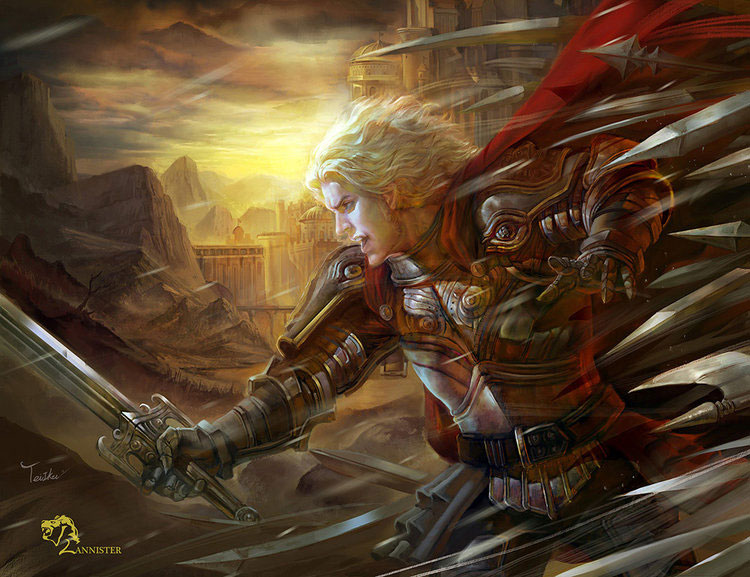 Determined to erase years of humiliation, he did not seek his lord father’s leave, nor even inform him of his intent, but rode forth himself with five hundred knights and three thousand men-at-arms and crossbowmen behind him. His brothers Kevan and Tygett went with him, one as a knight, one a squire. Lord Marbrand of Ashmark, Lord Prester of Feastfives, and a dozen lesser lords joined him on the march with their own levies, swelling his numbers.
Determined to erase years of humiliation, he did not seek his lord father’s leave, nor even inform him of his intent, but rode forth himself with five hundred knights and three thousand men-at-arms and crossbowmen behind him. His brothers Kevan and Tygett went with him, one as a knight, one a squire. Lord Marbrand of Ashmark, Lord Prester of Feastfives, and a dozen lesser lords joined him on the march with their own levies, swelling his numbers.
House Tarbeck was the first to feel Ser Tywin’s wroth. Secure in his own strength, and that of his numerous friends and allies, Lord Walderan had oft been heard to boast that he had “no fear of lion cubs,” but the Lannister host descended on him so quickly that his vassals and supporters had no time to gather. Foolishly his lordship rode forth to meet Ser Tywin’s host with only his household knights beside him. In a short, brutal battle, the Tarbecks were broken and butchered.
Lord Walderan Tarbeck was wounded and taken alive, with two of his sons from his second marriage (the only surviving son from his first marriage had died during the battle). “Well, you have us, boy,” Lord Tarbeck told Ser Tywin when he was led before him. “We’re worth a good ransom, as I am sure you know. Ask what you will, my lady wife will pay.”
“With our own gold,” Ser Tywin reportedly replied. “No, my lord. I think not.” Whereupon he gave a command, and watched cold-eyed as Lord Tarbeck and his sons were beheaded, together with his nephews and cousins, his daughters’s husbands, and any man who displayed the seven-pointed blue-and-silver star upon his shield or surcoat to boast of Tarbeck blood. When the Lannister host resumed its march to Tarbeck Hall, the heads of Lord Walderan and his sons went before them, impaled on spears.
At their approach, Lady Ellyn Tarbeck closed her gates and sent forth ravens to Castamere, summoning her brothers. When Ser Kevan Lannister approached under a peace banner to demand her surrender, she laughed at him, and said, “You are not the only lions in the west, ser. My brothers are coming, and their claws are just as long and sharp as yours.”
Her defiance was misplaced. Tarbeck Hall was an old castle, and most of its defenders had ridden into battle with Lord Walderan, and were dead or fled. Those who remained were daunted by the size of the Lannister host, and dismayed to see the heads of their own lord and his sons impaled beneath their banners. (It may be also that some of those within had been suborned by Lannister gold, for Twyin Lannister was not a man to leave the outcome of any battle to chance, as subsequent decades would prove).
Trusting in her walls, Lady Tarbeck no doubt anticipated a long siege, but Ser Tywin sent his men-at-arms surging forward with ladders and grappling hooks and battering rams instead. The fighting lasted less than an hour, accounts agree. As the ram smashed through the castle’s main gates, two other gates were opened from within, and the Lannisters came swarming through. Those who fled were spared; those who fought were put to the sword. Ellyn Tarbeck herself was taken with her children, and thrown from the window of the castle’s tallest tower, to strangle kicking at the end of a noose. Her son Tion the Red preceded her in death, cut down in the fighting at the main gates. He was nineteen years of age when he died, the same age as Tywin Lannister. Her daughters Rohanne and Cyrelle, whose husbands had been beheaded with Lord Walderan, were taken alive, and spent the remainder of their lives with the silent sisters (accounts differ as to whether Ser Tywin first had their tongues removed).
Lady Ellyn’s elder daughter, Rohanne, was mother to a three-year-old son, remembered in the songs as “the last Lord Tarbeck.” The boy disappeared the day of the battle, never to be seen again. Those of a romantic bent believe that he was smuggled from the burning castle in disguise, grew to manhood across the narrow sea, and became a bard famed for his sad ballads. More reliable reports suggest that he was thrown down a well by Ser Amory Lorch, though whether this was done at the behest of Ser Tywin or without his knowledge remains in dispute.
 When the last resistance had been quelled, Tywin Lannister ordered Tarbeck Hall put to the torch. The castle burned for a day and a night, until nought remained but a blackened shell.
When the last resistance had been quelled, Tywin Lannister ordered Tarbeck Hall put to the torch. The castle burned for a day and a night, until nought remained but a blackened shell.
The Red Lion arrived in time to see the flames, we are told. Two thousand men rode with him, all he had been able to gather in the short time available to him. Only one in ten was a knight. Given time, Lord Roger could have assembled a much larger host, for House Reyne had many friends in the west, and his own repute as a warrior would surely have drawn many freeriders, hedge knights, and sellswords to his side. In his haste to respond to his sister’s peril, however, his lordship had set forth with less than a quarter of his full strength, and driven them hard over long leagues, only to arrive at Tarbeck Hall hungry, exhausted, and too late.
Tywin Lannister had three times his strength, most accounts agree; some insist the Lannisters outnumbered the Reynes five to one. A more prudent commander would surely have fallen back rather than face such odds, but the Red Lion of Castamere had never been prudent. Hoping that surprise might carry the day, Roger Reyne commanded his trumpets to sound the attack, and charged headlong toward Ser Tywin’s camp.
The battle that ensued was a closer thing than might have been expected, for the Lannisters had not formed up and the suddenness of the attack took them by surprise. If Lord Reyne had only had more heavy horse, his knights might well have been able to cut their way through to where Ser Tywin’s banner flew above his command tent. But there was too much distance to cover and too many men between them, and after the first shock the Lannisters recovered quickly, whereupon their numbers soon began to tell. Tywin Lannister himself led the counterattack.
His charge blunted, Lord Reyne had no choice but to wheel and flee, but he left near half his men dead upon the field. A rain of crossbow bolts chased his riders from the camp; one took Lord Reyne between the shoulders, punching through his backplate.
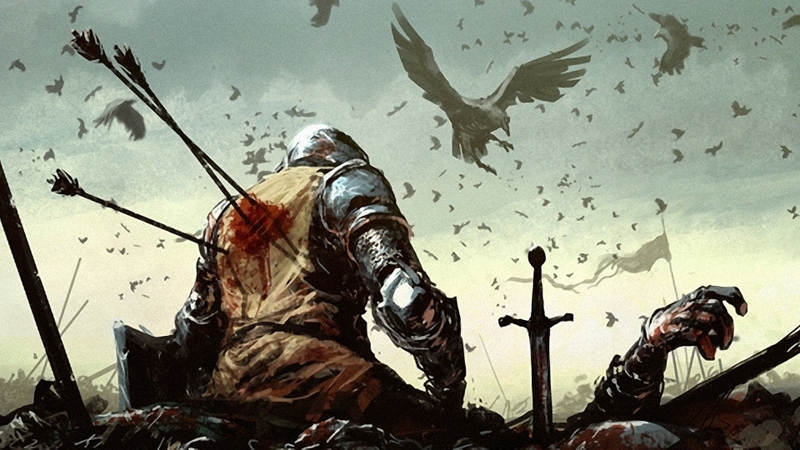
Though not a mortal wound, the quarrel went deep enough to draw blood. The Red Lion rode on, swaying in the saddle, only to fall from his horse less than a half a league away. He had to be carried back to Castamere.
The Lannister host, swollen to twice its original size by the arrival of the Lords Westerling, Banefort, Plumm, and Stackspear with their levies, arrived at Castamere three days later. Lord Reyne had sent forth ravens to his own friends, allies, and vassals, but few had turned up; the lesson of Tarbeck Hall had not been lost on them.
Castamere would prove to be a tougher nut to crack, however. Like Casterly Rock, the seat of House Reyne had begun as a mine. Rich veins of gold and silver had made the Reynes near as wealthy as the Lannisters during the Age of Heroes; to defend their riches, they had raised curtain walls about the entrance to their mine, closed it with an oak-and-iron gate, and flanked it with a pair of stout towers. Keeps and halls had followed, but all the while the mineshafts had gone deeper and deeper, and when at last the gold gave out, they had been widened into halls and galleries and snug bedchambers, a warren of tunnels and a vast echoing ballroom. To the ignorant eye, Castamere seemed a modest holding, a fit seat for a landed knight or small lord, but those who knew its secrets knew that nine-tenths of the castle was beneath the ground.
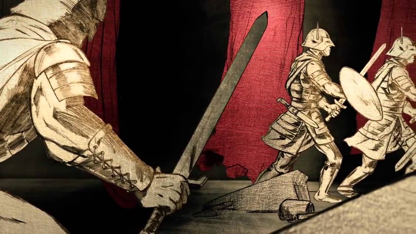
It was to those deep chambers that the Reynes retreated now. Feverish and weak from loss of blood, the Red Lion was in no fit state to lead. Ser Reynard, his brother, assumed command in his stead. Less headstrong but more cunning than his brother, Reynard knew he did not have the men to defend the castle walls, so he abandoned the surface entirely to the foe, and fell back beneath the earth. Designed for defense, the mines at Castamere had never been taken. There were only three ways down into them, all cramped, narrow, twisting, and studded with deadfalls, pits, and murder holes. Two armored knights, standing side by side, could hold the largest tunnel against a thousand, for attackers had no way around, and if they tried to cut their way past, defenders would be pouring boiling oil and pitch down on them from murder holes above as they fought.
Once all his folk were safe inside the tunnels, Ser Reynard sent word to Ser Tywin above, offering terms. “You cannot fight your way in, and we have food and water sufficient for three years,” he wrote, “but grant us full pardon for any past offenses, and send your brothers down to us as hostages against deceit, and we shall once again be your true and leal servants.”
This time, however, his glib words fell upon deaf ears. Tywin Lannister did not honor Ser Reynard’s offer with a reply. Nor did he respond to Lord Roger’s offer to settle the matter by single combat (an offer Tywin might have accepted, had he known that the Red Lion had grown so weak he could hardly stand).
Neither did he intend to send men to die in the dark, fighting their way down. Instead Tywin Lannister commanded that mines be sealed. With pick and axe and torch, his own miners brought down tons of stone and soil, burying the great gates to the mines one by one, until there was no way in and no way out. Once that was done, he turned his attention to the small, swift stream that fed the crystalline blue pool beside the castle from which Castamere took its name. With thousands of men on hand, and no foe to face, it took less than a day to dam the stream, and only two to divert it to the nearest mine entrance.
The earth and stone that sealed the mine had no gaps large enough to allow a squirrel to pass, let alone a man. . . but the water found its way down.
Ser Reynard had taken more than three hundred men, women, and children into the mines, it is said. Not a one emerged. A few of the guards assigned to the smallest and most distant of the mine entrances reported hearing faint screams and shouts coming from beneath the earth one night, but by daybreak the stones had gone silent once again.

No one has ever reopened the mines of Castamere. The halls and keeps above them, put to the torch by Tywin Lannister, stand empty to this day, a mute testament to the fate that awaits those foolish enough to take up arms against the lions of the Rock.
Hand of the King
In 262 AC, King Jaehaerys II died in King’s Landing, having sat the Iron Throne for only three years. His son Aerys, Prince of Dragonstone, succeeded him as King Aerys II. His first act as king – and his wisest, many say – was to summon his boyhood friend Tywin Lannister from Casterly Rock, and name him the Hand of the King.
Ser Tywin was but twenty, the youngest man ever to serve as Hand, and amongst the youngest ever to sit upon the small council, but the manner in which he had dealt the rising of the Reynes and Tarbecks had made him well respected, even feared, throughout the Seven Kingdoms, and there were few who dared speak against his appointment.
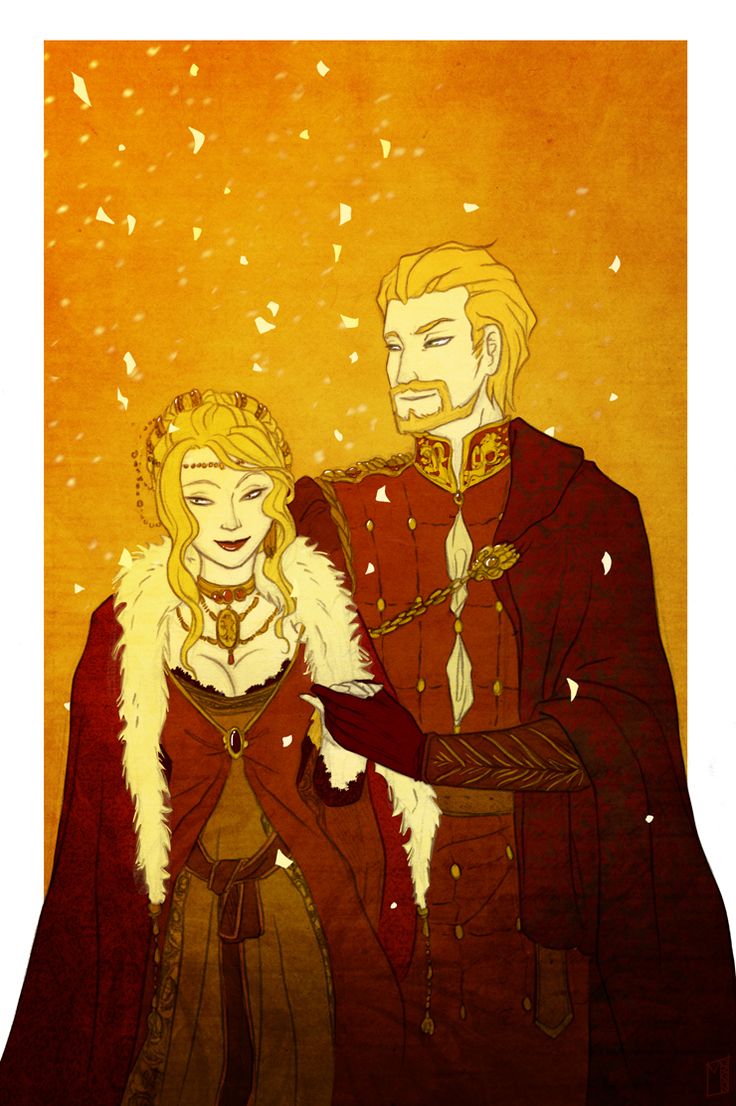 His cousin Lady Joanna, the daughter of Lord Tytos’s late brother Ser Jason, accompanied him to King’s Landing, to serve as a lady in waiting and companion to Queen Rhaella. A year later, she and Ser Tywin were wed in a lavish ceremony at the Great Sept of Baelor, with King Aerys himself presiding over the wedding feast and bedding.
His cousin Lady Joanna, the daughter of Lord Tytos’s late brother Ser Jason, accompanied him to King’s Landing, to serve as a lady in waiting and companion to Queen Rhaella. A year later, she and Ser Tywin were wed in a lavish ceremony at the Great Sept of Baelor, with King Aerys himself presiding over the wedding feast and bedding.
A long period of peace and prosperity followed. Though Aerys II grew increasingly erratic over time, for many years he was content to leave the day-to-day running of his realm to his Hand, a task at which Tywin Lannister excelled. In 266 AC, Lady Joanna gave birth to twins, a boy and a girl. Meanwhile, Ser Tywin’s brother Ser Kevan had also wed, taking to bride the daughter of Ser Harys Swyft of Cornfield, who had once been given to him as a hostage for her father’s debts.
In 267 AC, Lord Tytos Lannister’s heart burst as he was climbing a steep flight to steps to the bedchamber of his mistress (his lordship had finally but aside his wet nurse, only to become besotted with the charms of a candlemaker’s daughter).
At the age of five-and-twenty, Tywin Lannister became the Lord of Casterly Rock, Shield of Lannisport, and Warden of the West. With the Laughing Lion at last laid to rest, House Lannister had never been stronger nor more secure. The years that followed were golden ones, not only for the westerlands, but for all the Seven Kindoms.
There was a worm inside the apple, though, for the growing madness of King Aerys II Targaryen would soon imperil all that Tywin Lannister sought to build. His lordship suffered great personal loss as well, for his beloved wife Lady Joanna died in 273 AC whilst giving birth to a hideously deformed child. With her death, Grand Maester Pycelle observes, the joy went out of Tywin Lannister, yet still he persisted in his duty.
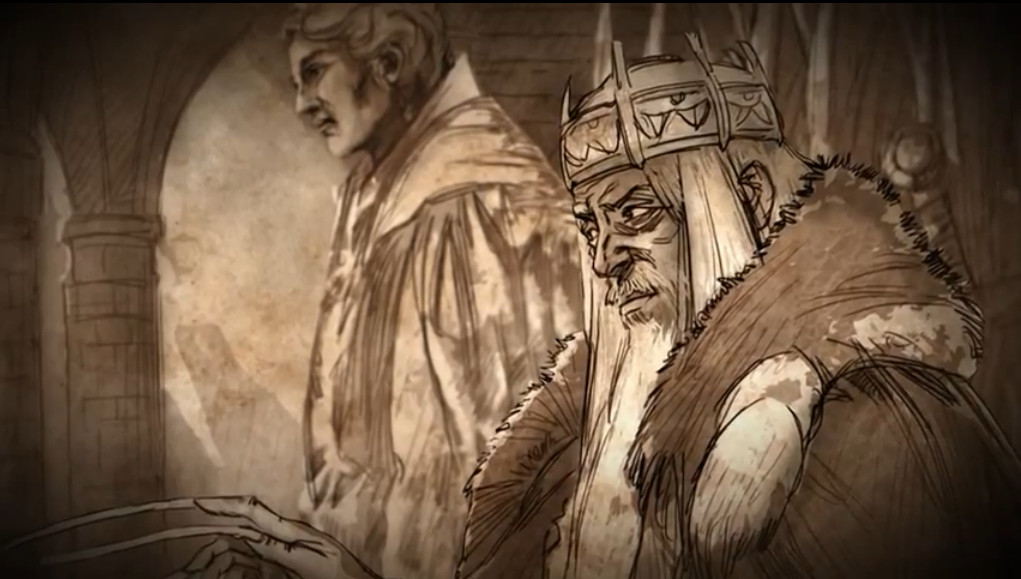
Day by day and year by year, Aerys II turned ever more against his own Hand, the friend of his childhood, subjecting him to a succession of reproofs, reverses, and humiliations. Lord Tywin’s brother Ser Tygett was denied a place at court; the captain of Lord Tywin’s own guard had his tongue torn out with hot pincers at the king’s command; when his lordship offered his own beloved daughter Cersei as a bride for King Aerys’s heir, Prince Rhaegar, His Grace declared her unworthy of his own son; “twisting the lion’s tail” became as popular a game at the Red Keep as once it had been at Casterly Rock. All this Lord Tywin suffered, even the insult to his daughter, but when the king made his son and heir, Ser Jaime, a knight of the Kingsguard, he could endure no longer. Lord Tywin at last resigned the Handship in 281 AC.
Bereft of the counsel of the man he had relied upon so long, surrounded by lickspittles and schemers, King Aerys II was soon swallowed up entirely by his madness as the realm fell to pieces around him.
We have chronicled Robert’s Rebellion elsewhere, so we shall not tell that tale again, save to note that Lord Tywin kept the westerlands out of the war until its end, when he led a great Lannister host out of the west to capture King’s Landing and the Red Keep for Robert Baratheon. Nigh unto three hundred years of Targaryen rule were brought to an end by the swords of Lord Tywin and his westermen.
The following year, King Robert I Baratheon took Lord Tywin’s daughter, the Lady Cersei, to wife, joining two of the greatest and noblest Houses in all Westeros. The birth of a son and heir, Prince Joffrey, in 286 AC was the cause for great celebration through all the Seven Kingdoms. With the succession now upon a firm footing, a time of peace and prosperity beckons, in no small due to the efforts of Lord Tywin Lannister and the men of the west.

Casterly Rock
Casterly Rock, the ancient seat of House Lannister, is no ordinary castle. Although crowned with towers and turrets and watchtowers, with stone walls and oaken gates and iron portcullises guarding its every means of egress, this ancient fortress is in truth a colossal rock beside the Sunset Sea, a rock which some say have looks like a lion in repose when the sun sets and the shadows fall.
The Rock has been a habitation for men for thousands of years. Before the coming of the First Men it seems likely that the children of the forest made their homes in the great sea-carved caverns at its base. Bears, lions, wolves, and bats have also been known to make their lairs within, along with countless lesser creatures.
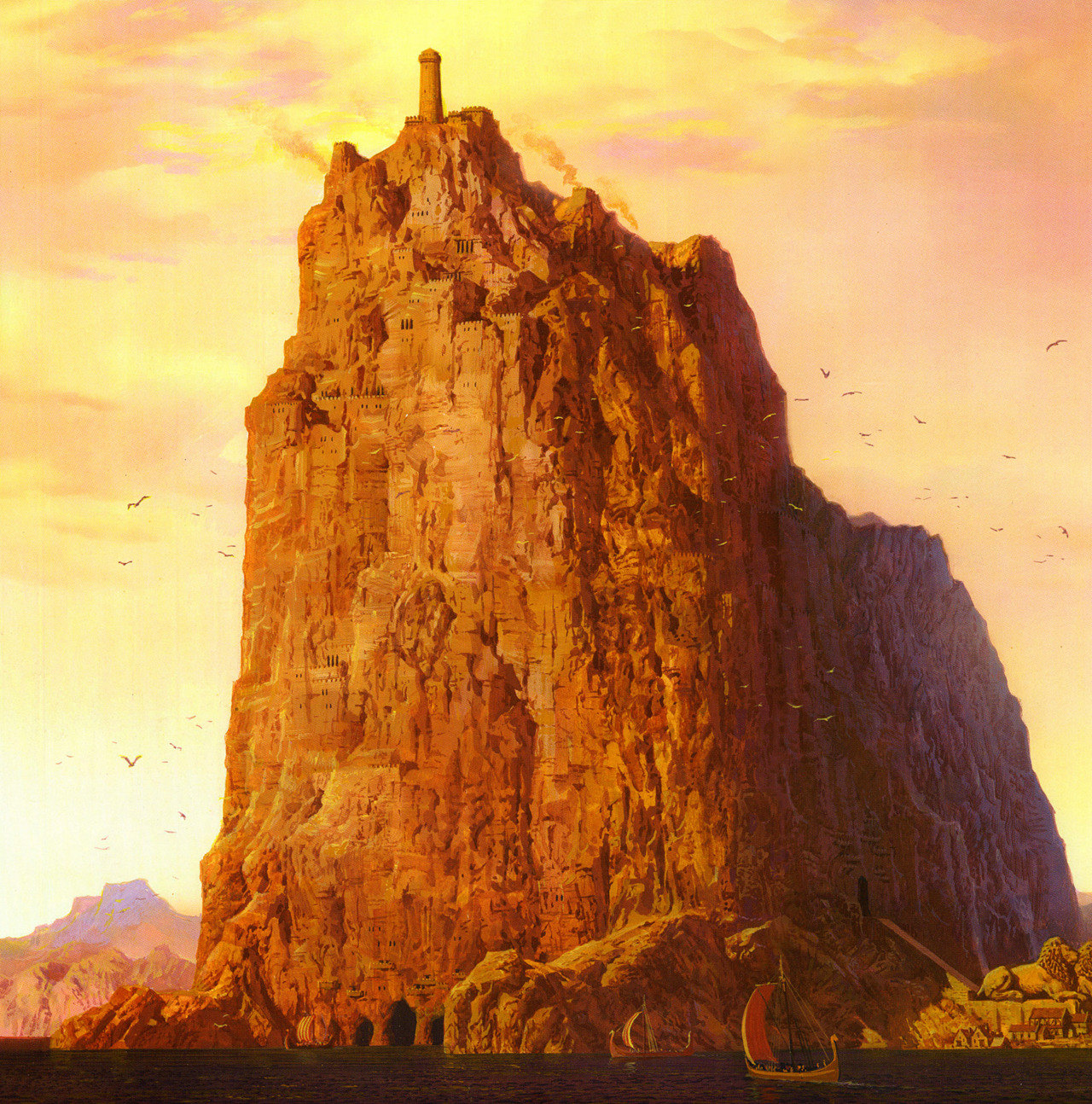
Hundreds of mine shafts penetrate the lower parts of the Rock, where many veins of red and yellow gold gleam untouched in the stone even after millennia of mining. The Casterlys were the first to begin to carve halls and chambers from the mineshafts, and they established a ringfort on the Rock’s peak from which they could survey their domain.
The Rock has been measured as thrice the height of the Wall or the Hightower of Oldtown. Almost two leagues long from west to east, it is riddled throughout with tunnels, dungeons, storerooms, barracks, halls, stables, stairways, courtyards, balconies, and gardens. There is even a godswood of sorts, though the weirwood that grows there is a queer, twisted thing whose tangled roots have all but filled the cave where it stands, choking out all other growth.
The Rock even has a port inside it, complete with docks and wharfs and shipyards, for the sea has carved great caves into its western face, natural gates deep and wide enough for longships and even cogs to enter and offload their cargoes.
The Lion’s Mouth — the huge natural cavern that forms the main entrance into the Rock – arches two hundred feet high from floor to ceiling. Over the centuries it has been widened and improved upon, and it is now said that twenty horsemen can ride abreast up its broad steps.
Casterly Rock has never been taken by storm or siege. No castle in the Seven Kingdoms is larger, richer, or better defended. Legends says that Visenya Targaryen, upon seeing it, thanked the gods that King Loren rode forth to face her brother Aegon on the Field of Fire, for if he had remained within the Rock, even dragonflame would not have daunted him.
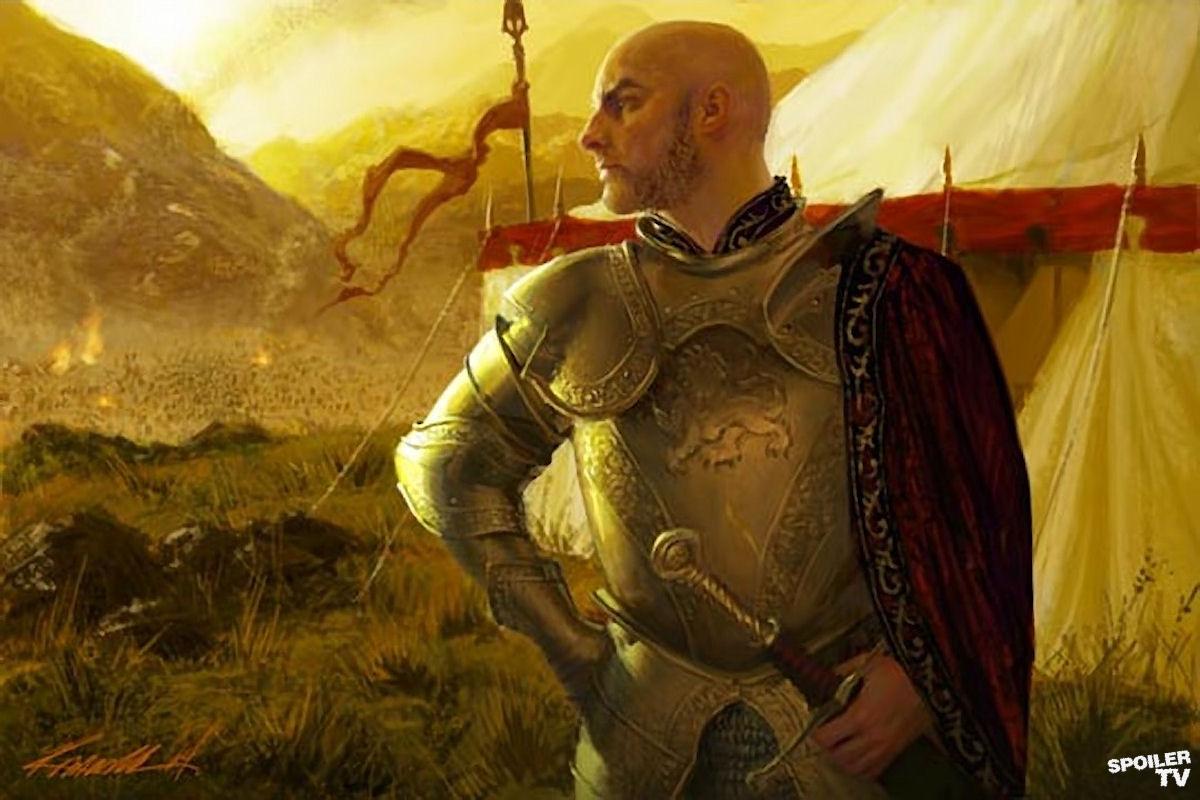
The Lords of Casterly Rock have gathered many treasures over the centuries, and the sights of the Rock–especially the Golden Gallery, with its gilded ornaments and walls, and the Hall of Heroes where the costly armor worn by a hundred Lannister knights, lords, and kings stand eternal guard — are justly famed throughout the Seven Kingdoms, even in lands beyond the narrow sea.

Conditions in the west grew so bad that the Iron Throne felt compelled to take a hand. Thrice King Aegon V sent forth his knights to restore order to the westerlands, but each time the conflicts flared up once again as soon as the king’s men had taken their leave. When His Grace perished in the tragedy at Summerhall in 259 AC, conditions in the west deteriorated even further, for the new king, Jaehaerys II Targaryen, lacked his sire’s strength of will, and was besides soon embroiled in the War of the Ninepenny Kings.
A thousand knights and ten thousand men-at-arms went forth from the westerlands at the king’s call, but Lord Tytos was not amongst them. His lordship’s brother was given command in his stead, but in 260 AC Ser Jason Lannister died on Bloodstone. (Later it would be put about that he was slain by Maelys the Monstrous himself, but contemporary accounts do not bear this out; it was a flux of the bowels that laid Ser Jason in his grave, not a foeman’s axe). After his death, Ser Roger Reyne seized command of the remaining westermen and led them to several notable victories. By the war’s end, the Red Lion was counted amongst the heroes of the fighting.
Lord Tytos’s three eldest sons also aquitted themselves well upon the Stepstones, however. Knighted on the eve of the conflict, Ser Tywin Lannister fought in the retinue of the king’s young heir, Aerys, Prince of Dragonstone, and was given the honor of dubbing him a knight at war’s end. Kevan Lannister, squiring for the Red Lion, also won his spurs, and was knighted by Roger Reyne himself. Their brother Tygett, a squire of ten, was too young for knighthood, but his courage and skill at arms were remarked upon by all, for he slew a grown man in his first battle and three more in later fights, one of them a knight of the Golden Company. “Those who beheld these proud young lions on the battlefield might rightly wonder how such could ever have sprung from the loins of the quivering fool beneath the Rock,” Grand Maester Pycelle wrote scornfully in his Observations Upon the Recent Blood-Letting on the Stepstones.
His strong words were not unwarranted, for whilst his cubs and were fighting on the Stepstones, Tytos Lannister remained at Casterly Rock, in the company of a certain young woman of low birth who had caught his eye whilst serving as a wet nurse to his youngest son. With most of the great lords away at war for the best part of two years, the ruler of the westerlands in all but name became the lord who had stayed at home, Walderan Tarbeck, who was himself ruled by his wife, the Lady Ellyn.
The return of Lord Tytos’s sons from war put an abrupt end to that. Hardened by battle, and all too aware of the low regard in which the other lords of the realm held his father, Ser Tywin Lannister set to at once to restore the pride and power of Casterly Rock. His sire protested but feebly, we are told, and then retreated back to the arms of his wet nurse, whilst his heir took command.
Ser Tywin began by demanding repayment of all the gold Lord Tytos had lent out. Those who could not pay were required to send hostages to Casterly Rock. All those lords who had engaged in private wars during the previous decade were summoned to court, to have their disputes adjudicated by their liege lord. Five hundred knights, blooded and seasoned veterans of the Stepstones, were formed into a new company under the command of Ser Tywin’s brother Ser Kevan, and charged with ridding the west of robber knights and outlaws, and “assisting in the collection of unpaid debts due to his lordship, my sire.” Moreover, the lords of the west were commanded to feed and shelter Ser Kevan’s “collectors” as they made their way from castle to castle.
Some hastened to obey. “The lion has awoken,” said Ser Harys Swyft, the Knight of Cornfield, when the collectors arrived at his castle gates. Unable to repay his debt, he turned his daughter over to Ser Kevan as a hostage instead. But elsewhere, the collectors were met with sullen resistance and open defiance. Lord Reyne reportedly laughed when his maester read him Ser Tywin’s edicts, and counseled his friends and vassals to do nothing. “The cub will soon grow weary of chasing his own tail,” he said. . . yet he set about strengthening the defenses of Castamere as well.
Lord Walderan Tarbeck unwisely chose a different course. He rode to Casterly Rock to protest, confident in his ability to cow Lord Tytos and force him to rescind his son’s edicts. “I will have the fat fool soiling his breeches and the boy leashed and muzzled before I take my leave of them,” he told his lady wife as he took his leave of Tarbeck Hall.
At Casterly Rock, however, Lord Tarbeck was denied an audience with Lord Tytos, and found himself facing his son instead. Ser Tywin allowed him to bluster and threaten and make his demands, then had him consigned to a dungeon “until such time as you give up the lands you have stolen, and repay every speck of gold my lord father lent you.”
With Lord Walderan in chains, Tywin Lannister no doubt expected the Tarbecks to yield. Lady Tarbeck was quick to disabuse him of that notion. Instead that reboubtable woman sent forth her own knights and captured three Lannisters (along with two sons of Lord Prester, and half a dozen common girls who had met them in the wood by Feastfires for purposes of dalliance). Two of the captives were Lannisters of Lannisport, distant kin to the Lannisters of Casterly Rock, but the third was a young squire, Stafford Lannister, the eldest son and heir of Lord Tytos’s late brother, Ser Jason. “Send back my lord and love, or these three shall answer for any harm that may come to him,” Lady Ellyn wrote to Casterly Rock. Wiser than her lord, she knew better than to come herself.
The resulting crisis drew Lord Tytos away from his wet nurse long enough to overrule his strong-willed heir. Ser Tywin urged his lord father to comply with Lady Tarbeck’s request by returning Lord Walderan in three pieces, a suggestion that left Lord Tytos aghast. “Lady Ellyn holds my nephew’s life in her hands,” he told his son. Whereupon his lordship not only commanded that Lord Tarbeck be released, unharmed, but went so far as to apologize to him, and forgive him his debts.
To safeguard the exchange of hostages, Lord Tytos turned to Lady Tarbeck’s younger brother, Ser Reynard Reyne, who was pleased to oblige. The Red Lion’s formidable seat at Castamere was chosen to host the meet. Ser Tywin refused to attend, so it was Ser Kevan who returned Lord Walderan, whilst Lady Tarbeck herself delivered Stafford and his cousins. Lord Reyne feasted all the parties, and a great show of amity was staged, with Lannisters and Tarbecks toasting one another, exchanging gifts and kisses, and vowing to remain each other’s leal friends “through all eternity.”
All eternity lasted not quite a year, Grand Maester Pycelle observed later. Tywin Lannister, who had not been present at the Red Lion’s feast, had never weakened in his resolve to bring these overmighty vassals to heel. Late in the year 261 AC, with all his preparations complete, he sent ravens to Castamere and Tarbeck Hall, demanding that Roger and Reynard Reyne and Lord and Lady Tarbeck present themselves at Casterly Rock “to answer for your crimes.” The Reynes and Tarbecks chose defiance instead, as Ser Tywin surely knew they would. Both Houses rose in open revolt, renouncing their fealty to Casterly Rock. Tywin Lannister called the banners.

House Tarbeck was the first to feel Ser Tywin’s wroth. Secure in his own strength, and that of his numerous friends and allies, Lord Walderan had oft been heard to boast that he had “no fear of lion cubs,” but the Lannister host descended on him so quickly that his vassals and supporters had no time to gather. Foolishly his lordship rode forth to meet Ser Tywin’s host with only his household knights beside him. In a short, brutal battle, the Tarbecks were broken and butchered.
Lord Walderan Tarbeck was wounded and taken alive, with two of his sons from his second marriage (the only surviving son from his first marriage had died during the battle). “Well, you have us, boy,” Lord Tarbeck told Ser Tywin when he was led before him. “We’re worth a good ransom, as I am sure you know. Ask what you will, my lady wife will pay.”
“With our own gold,” Ser Tywin reportedly replied. “No, my lord. I think not.” Whereupon he gave a command, and watched cold-eyed as Lord Tarbeck and his sons were beheaded, together with his nephews and cousins, his daughters’s husbands, and any man who displayed the seven-pointed blue-and-silver star upon his shield or surcoat to boast of Tarbeck blood. When the Lannister host resumed its march to Tarbeck Hall, the heads of Lord Walderan and his sons went before them, impaled on spears.
At their approach, Lady Ellyn Tarbeck closed her gates and sent forth ravens to Castamere, summoning her brothers. When Ser Kevan Lannister approached under a peace banner to demand her surrender, she laughed at him, and said, “You are not the only lions in the west, ser. My brothers are coming, and their claws are just as long and sharp as yours.”
Her defiance was misplaced. Tarbeck Hall was an old castle, and most of its defenders had ridden into battle with Lord Walderan, and were dead or fled. Those who remained were daunted by the size of the Lannister host, and dismayed to see the heads of their own lord and his sons impaled beneath their banners. (It may be also that some of those within had been suborned by Lannister gold, for Twyin Lannister was not a man to leave the outcome of any battle to chance, as subsequent decades would prove).
Trusting in her walls, Lady Tarbeck no doubt anticipated a long siege, but Ser Tywin sent his men-at-arms surging forward with ladders and grappling hooks and battering rams instead. The fighting lasted less than an hour, accounts agree. As the ram smashed through the castle’s main gates, two other gates were opened from within, and the Lannisters came swarming through. Those who fled were spared; those who fought were put to the sword. Ellyn Tarbeck herself was taken with her children, and thrown from the window of the castle’s tallest tower, to strangle kicking at the end of a noose. Her son Tion the Red preceded her in death, cut down in the fighting at the main gates. He was nineteen years of age when he died, the same age as Tywin Lannister. Her daughters Rohanne and Cyrelle, whose husbands had been beheaded with Lord Walderan, were taken alive, and spent the remainder of their lives with the silent sisters (accounts differ as to whether Ser Tywin first had their tongues removed).
Lady Ellyn’s elder daughter, Rohanne, was mother to a three-year-old son, remembered in the songs as “the last Lord Tarbeck.” The boy disappeared the day of the battle, never to be seen again. Those of a romantic bent believe that he was smuggled from the burning castle in disguise, grew to manhood across the narrow sea, and became a bard famed for his sad ballads. More reliable reports suggest that he was thrown down a well by Ser Amory Lorch, though whether this was done at the behest of Ser Tywin or without his knowledge remains in dispute.

The Red Lion arrived in time to see the flames, we are told. Two thousand men rode with him, all he had been able to gather in the short time available to him. Only one in ten was a knight. Given time, Lord Roger could have assembled a much larger host, for House Reyne had many friends in the west, and his own repute as a warrior would surely have drawn many freeriders, hedge knights, and sellswords to his side. In his haste to respond to his sister’s peril, however, his lordship had set forth with less than a quarter of his full strength, and driven them hard over long leagues, only to arrive at Tarbeck Hall hungry, exhausted, and too late.
Tywin Lannister had three times his strength, most accounts agree; some insist the Lannisters outnumbered the Reynes five to one. A more prudent commander would surely have fallen back rather than face such odds, but the Red Lion of Castamere had never been prudent. Hoping that surprise might carry the day, Roger Reyne commanded his trumpets to sound the attack, and charged headlong toward Ser Tywin’s camp.
The battle that ensued was a closer thing than might have been expected, for the Lannisters had not formed up and the suddenness of the attack took them by surprise. If Lord Reyne had only had more heavy horse, his knights might well have been able to cut their way through to where Ser Tywin’s banner flew above his command tent. But there was too much distance to cover and too many men between them, and after the first shock the Lannisters recovered quickly, whereupon their numbers soon began to tell. Tywin Lannister himself led the counterattack.
His charge blunted, Lord Reyne had no choice but to wheel and flee, but he left near half his men dead upon the field. A rain of crossbow bolts chased his riders from the camp; one took Lord Reyne between the shoulders, punching through his backplate.

Though not a mortal wound, the quarrel went deep enough to draw blood. The Red Lion rode on, swaying in the saddle, only to fall from his horse less than a half a league away. He had to be carried back to Castamere.
The Lannister host, swollen to twice its original size by the arrival of the Lords Westerling, Banefort, Plumm, and Stackspear with their levies, arrived at Castamere three days later. Lord Reyne had sent forth ravens to his own friends, allies, and vassals, but few had turned up; the lesson of Tarbeck Hall had not been lost on them.
Castamere would prove to be a tougher nut to crack, however. Like Casterly Rock, the seat of House Reyne had begun as a mine. Rich veins of gold and silver had made the Reynes near as wealthy as the Lannisters during the Age of Heroes; to defend their riches, they had raised curtain walls about the entrance to their mine, closed it with an oak-and-iron gate, and flanked it with a pair of stout towers. Keeps and halls had followed, but all the while the mineshafts had gone deeper and deeper, and when at last the gold gave out, they had been widened into halls and galleries and snug bedchambers, a warren of tunnels and a vast echoing ballroom. To the ignorant eye, Castamere seemed a modest holding, a fit seat for a landed knight or small lord, but those who knew its secrets knew that nine-tenths of the castle was beneath the ground.

It was to those deep chambers that the Reynes retreated now. Feverish and weak from loss of blood, the Red Lion was in no fit state to lead. Ser Reynard, his brother, assumed command in his stead. Less headstrong but more cunning than his brother, Reynard knew he did not have the men to defend the castle walls, so he abandoned the surface entirely to the foe, and fell back beneath the earth. Designed for defense, the mines at Castamere had never been taken. There were only three ways down into them, all cramped, narrow, twisting, and studded with deadfalls, pits, and murder holes. Two armored knights, standing side by side, could hold the largest tunnel against a thousand, for attackers had no way around, and if they tried to cut their way past, defenders would be pouring boiling oil and pitch down on them from murder holes above as they fought.
Once all his folk were safe inside the tunnels, Ser Reynard sent word to Ser Tywin above, offering terms. “You cannot fight your way in, and we have food and water sufficient for three years,” he wrote, “but grant us full pardon for any past offenses, and send your brothers down to us as hostages against deceit, and we shall once again be your true and leal servants.”
This time, however, his glib words fell upon deaf ears. Tywin Lannister did not honor Ser Reynard’s offer with a reply. Nor did he respond to Lord Roger’s offer to settle the matter by single combat (an offer Tywin might have accepted, had he known that the Red Lion had grown so weak he could hardly stand).
Neither did he intend to send men to die in the dark, fighting their way down. Instead Tywin Lannister commanded that mines be sealed. With pick and axe and torch, his own miners brought down tons of stone and soil, burying the great gates to the mines one by one, until there was no way in and no way out. Once that was done, he turned his attention to the small, swift stream that fed the crystalline blue pool beside the castle from which Castamere took its name. With thousands of men on hand, and no foe to face, it took less than a day to dam the stream, and only two to divert it to the nearest mine entrance.
The earth and stone that sealed the mine had no gaps large enough to allow a squirrel to pass, let alone a man. . . but the water found its way down.
Ser Reynard had taken more than three hundred men, women, and children into the mines, it is said. Not a one emerged. A few of the guards assigned to the smallest and most distant of the mine entrances reported hearing faint screams and shouts coming from beneath the earth one night, but by daybreak the stones had gone silent once again.

No one has ever reopened the mines of Castamere. The halls and keeps above them, put to the torch by Tywin Lannister, stand empty to this day, a mute testament to the fate that awaits those foolish enough to take up arms against the lions of the Rock.
Hand of the King
In 262 AC, King Jaehaerys II died in King’s Landing, having sat the Iron Throne for only three years. His son Aerys, Prince of Dragonstone, succeeded him as King Aerys II. His first act as king – and his wisest, many say – was to summon his boyhood friend Tywin Lannister from Casterly Rock, and name him the Hand of the King.
Ser Tywin was but twenty, the youngest man ever to serve as Hand, and amongst the youngest ever to sit upon the small council, but the manner in which he had dealt the rising of the Reynes and Tarbecks had made him well respected, even feared, throughout the Seven Kingdoms, and there were few who dared speak against his appointment.

A long period of peace and prosperity followed. Though Aerys II grew increasingly erratic over time, for many years he was content to leave the day-to-day running of his realm to his Hand, a task at which Tywin Lannister excelled. In 266 AC, Lady Joanna gave birth to twins, a boy and a girl. Meanwhile, Ser Tywin’s brother Ser Kevan had also wed, taking to bride the daughter of Ser Harys Swyft of Cornfield, who had once been given to him as a hostage for her father’s debts.
In 267 AC, Lord Tytos Lannister’s heart burst as he was climbing a steep flight to steps to the bedchamber of his mistress (his lordship had finally but aside his wet nurse, only to become besotted with the charms of a candlemaker’s daughter).
At the age of five-and-twenty, Tywin Lannister became the Lord of Casterly Rock, Shield of Lannisport, and Warden of the West. With the Laughing Lion at last laid to rest, House Lannister had never been stronger nor more secure. The years that followed were golden ones, not only for the westerlands, but for all the Seven Kindoms.
There was a worm inside the apple, though, for the growing madness of King Aerys II Targaryen would soon imperil all that Tywin Lannister sought to build. His lordship suffered great personal loss as well, for his beloved wife Lady Joanna died in 273 AC whilst giving birth to a hideously deformed child. With her death, Grand Maester Pycelle observes, the joy went out of Tywin Lannister, yet still he persisted in his duty.

Day by day and year by year, Aerys II turned ever more against his own Hand, the friend of his childhood, subjecting him to a succession of reproofs, reverses, and humiliations. Lord Tywin’s brother Ser Tygett was denied a place at court; the captain of Lord Tywin’s own guard had his tongue torn out with hot pincers at the king’s command; when his lordship offered his own beloved daughter Cersei as a bride for King Aerys’s heir, Prince Rhaegar, His Grace declared her unworthy of his own son; “twisting the lion’s tail” became as popular a game at the Red Keep as once it had been at Casterly Rock. All this Lord Tywin suffered, even the insult to his daughter, but when the king made his son and heir, Ser Jaime, a knight of the Kingsguard, he could endure no longer. Lord Tywin at last resigned the Handship in 281 AC.
Bereft of the counsel of the man he had relied upon so long, surrounded by lickspittles and schemers, King Aerys II was soon swallowed up entirely by his madness as the realm fell to pieces around him.
We have chronicled Robert’s Rebellion elsewhere, so we shall not tell that tale again, save to note that Lord Tywin kept the westerlands out of the war until its end, when he led a great Lannister host out of the west to capture King’s Landing and the Red Keep for Robert Baratheon. Nigh unto three hundred years of Targaryen rule were brought to an end by the swords of Lord Tywin and his westermen.
The following year, King Robert I Baratheon took Lord Tywin’s daughter, the Lady Cersei, to wife, joining two of the greatest and noblest Houses in all Westeros. The birth of a son and heir, Prince Joffrey, in 286 AC was the cause for great celebration through all the Seven Kingdoms. With the succession now upon a firm footing, a time of peace and prosperity beckons, in no small due to the efforts of Lord Tywin Lannister and the men of the west.

Casterly Rock
Casterly Rock, the ancient seat of House Lannister, is no ordinary castle. Although crowned with towers and turrets and watchtowers, with stone walls and oaken gates and iron portcullises guarding its every means of egress, this ancient fortress is in truth a colossal rock beside the Sunset Sea, a rock which some say have looks like a lion in repose when the sun sets and the shadows fall.
The Rock has been a habitation for men for thousands of years. Before the coming of the First Men it seems likely that the children of the forest made their homes in the great sea-carved caverns at its base. Bears, lions, wolves, and bats have also been known to make their lairs within, along with countless lesser creatures.

Hundreds of mine shafts penetrate the lower parts of the Rock, where many veins of red and yellow gold gleam untouched in the stone even after millennia of mining. The Casterlys were the first to begin to carve halls and chambers from the mineshafts, and they established a ringfort on the Rock’s peak from which they could survey their domain.
The Rock has been measured as thrice the height of the Wall or the Hightower of Oldtown. Almost two leagues long from west to east, it is riddled throughout with tunnels, dungeons, storerooms, barracks, halls, stables, stairways, courtyards, balconies, and gardens. There is even a godswood of sorts, though the weirwood that grows there is a queer, twisted thing whose tangled roots have all but filled the cave where it stands, choking out all other growth.
The Rock even has a port inside it, complete with docks and wharfs and shipyards, for the sea has carved great caves into its western face, natural gates deep and wide enough for longships and even cogs to enter and offload their cargoes.
The Lion’s Mouth — the huge natural cavern that forms the main entrance into the Rock – arches two hundred feet high from floor to ceiling. Over the centuries it has been widened and improved upon, and it is now said that twenty horsemen can ride abreast up its broad steps.
Casterly Rock has never been taken by storm or siege. No castle in the Seven Kingdoms is larger, richer, or better defended. Legends says that Visenya Targaryen, upon seeing it, thanked the gods that King Loren rode forth to face her brother Aegon on the Field of Fire, for if he had remained within the Rock, even dragonflame would not have daunted him.

The Lords of Casterly Rock have gathered many treasures over the centuries, and the sights of the Rock–especially the Golden Gallery, with its gilded ornaments and walls, and the Hall of Heroes where the costly armor worn by a hundred Lannister knights, lords, and kings stand eternal guard — are justly famed throughout the Seven Kingdoms, even in lands beyond the narrow sea.




 Ну, "сейчас", - их потомки
Ну, "сейчас", - их потомки 
